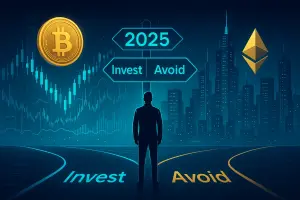تخيل عالمًا لا يتعين عليك فيه الوثوق بالبنوك للتحقق من المعاملات ، حيث يتم الاحتفاظ ببياناتك بأمان ولا يمكن تغييرها ، وحيث أن التكنولوجيا تتأكد من أن الثقة لا تقتصر على المؤسسات. مرحبًا بك في عالم blockchain ، وهو نوع جديد من تقنية دفتر الأستاذ الرقمية التي تجعل العملات المشفرة مثل عمل البيتكوين وأعمال Ethereum. ما هو blockchain ، وكيف يعمل؟ لنجعل من السهل الفهم.
ما هو blockchain؟ إنه دفتر الأستاذ الرقمي.
يمكنك التفكير في blockchain ككمبيوتر محمول رقمي. إنه يتتبع المعاملات ، ولكن على عكس دفتر الأستاذ العاديين ، لا يتم الاحتفاظ به في مكان واحد أو يديره بنك أو سلطة مركزية أخرى. هذا دفتر الأستاذ الرقمي ليس مركزيًا ؛ بدلاً من ذلك ، ينتشر على العديد من أجهزة الكمبيوتر (تسمى العقد) في جميع أنحاء العالم. هذا يعني أنه لا يوجد شخص أو مجموعة يمتلك أو يتحكم فيه ، مما يجعله آمنًا وواضحًا.
الكتل هي لبنات بناء blockchain.
فكر في كل معاملة كصفحة في المفكرة الرقمية لدينا. تصبح الصفحة كتلة عندما تكون مليئة بالمعاملات. ثم يتم وضع الكتل معًا بالترتيب الذي تم إنشاؤه لإنشاء سلسلة ، حيث تأتي كلمة "blockchain". يوجد رمز فريد في كل كتلة تسمى "التجزئة". هذا الرمز يشبه بصمة. يربط هذا التجزئة الكتلة بالكتلة التي سبقتها ، مع التأكد من ربط جميع الكتل بأمان.
التحقق بدون سلطة مركزية
في الماضي ، فحصت البنوك المعاملات. blockchain يحل هذا بطريقة جديدة ، باستخدام عمليات الإجماع. فكر في كيفية حاجة كل معاملة إلى موافقة أكثر من قاض أو عقدة. يتم تسجيل المعاملة في دفتر الأستاذ إذا وافق معظم الناس على أنه صحيح. يتأكد إجراء التحقق اللامركزي هذا من أنه لا يمكن لأي شخص تغيير البيانات.
blockchain وقواعد البيانات القديمة
قواعد البيانات التقليدية مثل أجهزة الكمبيوتر المحمولة الخاصة التي يمتلكها شخص واحد. إذا تم اختراقها ، فيمكن تغييرها أو فقدانها. ومع ذلك ، فإن blockchain عامة وينتشر بين العديد من العقد. هذا التشتت يعني أن دفتر الأستاذ يبقى دقيقًا حتى لو سقطت عقدة واحدة.
لماذا يعتبر blockchain مهمًا للعملات المشفرة
Blockchain هو ما يجعل العملات المشفرة مثل عملات البيتكوين و Ethereum. يتيح للناس إجراء معاملات آمنة بدون وسطاء. هذا يقلل من الرسوم والتأخيرات التي تأتي مع الأنظمة المصرفية التقليدية ويمنح الناس السيطرة على أصولهم.
استخدامات العالم الحقيقي وراء العملات المشفرة
يحتوي Blockchain على الكثير من الاستخدامات الأخرى إلى جانب الأموال الرقمية. يمكن أن يغير القطاعات بأكملها عن طريق جعل أنظمة التصويت آمنة ، وسلاسل التوريد الواضحة ، وإدارة سجلات الرعاية الصحية أكثر كفاءة ، وأكثر من ذلك.
بعض الأشياء التي يفكر بها الناس في blockchain ليست صحيحة
بسبب صفات الخصوصية ، يعتقد الكثير من الناس أن blockchain هو نفس النشاط البيتكوين أو النشاط غير المشروع. في الواقع ، يجعل انفتاح Blockchain من الممكن للناس أن يروا ما يفعله الآخرون مع الحفاظ على سرية هوياتهم ، مما يشجع المساءلة.
إيجابيات وسلبيات blockchain
يتمتع Blockchain بالعديد من المزايا ، بما في ذلك الأمن من خلال اللامركزية ، والانفتاح من خلال تسجيل جميع المعاملات ، والثقة من خلال التخلص من الحاجة إلى الوسطاء. ولكن هناك أيضًا مشاكل ، مثل قيود قابلية التوسع ، مما يعني القدرة على التعامل مع الكثير من المعاملات بسرعة وسهولة ، والمخاوف التنظيمية ، حيث تحاول الحكومات معرفة كيفية التعامل مع هذه التكنولوجيا الجديدة.
التأكد من السلامة والانفتاح والثقة
Blockchain آمن لأنه لا مركزي. لا توجد نقطة فشل واحدة لأن كل عقدة يمكن أن ترى دفتر الأستاذ بأكمله. يمكن رؤية جميع المعاملات على الشبكة ، ولكنها محمية بطرق التشفير التي تحمي خصوصية المستخدمين أثناء بناء الثقة بين المشاركين.
في الختام ، Blockchain هو أكثر من مجرد العمود الفقري للعملات المشفرة. إنها تقنية جديدة ستغير العديد من الحقول من خلال جعلها أكثر أمانًا وأكثر انفتاحًا وأكثر جدارة بالثقة بطرق لم تكن ممكنة من قبل. يمكن أن يؤدي استخدام هذه التكنولوجيا إلى فتح طرق جديدة لتكون أكثر كفاءة وإبداع في الشركات في جميع أنحاء العالم!

